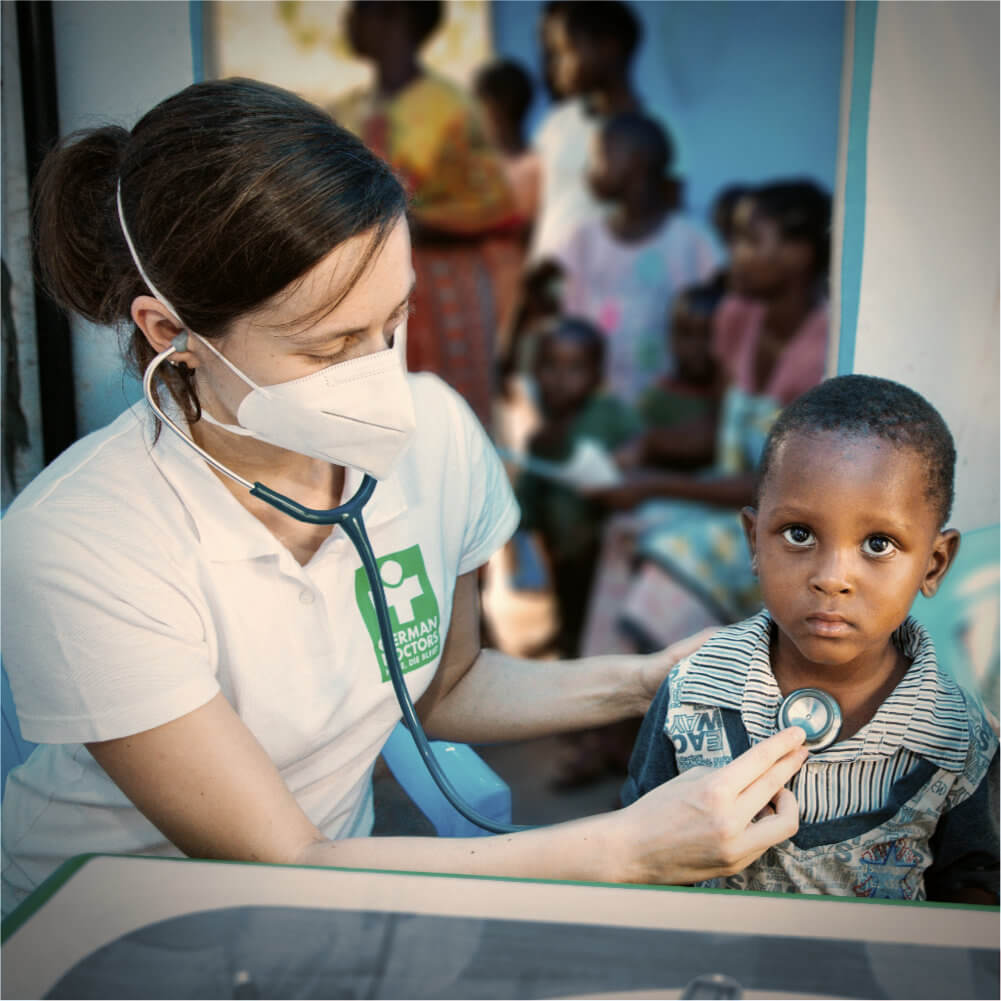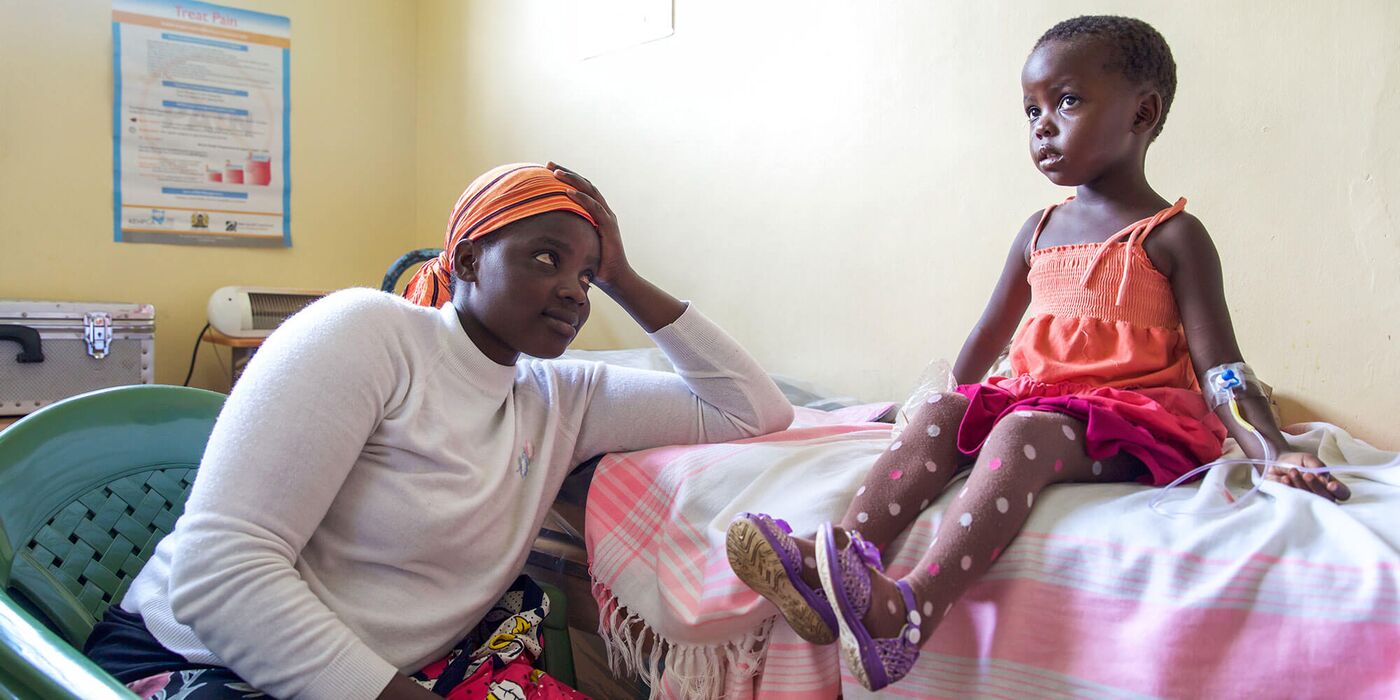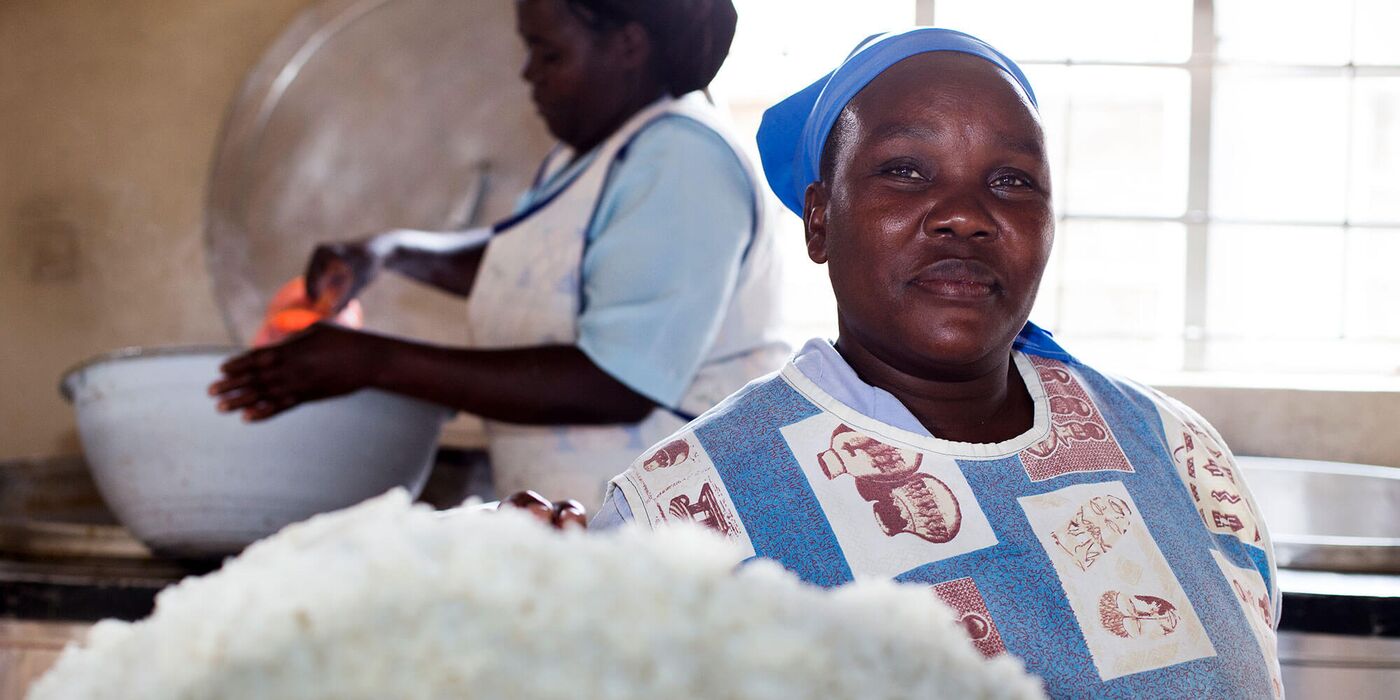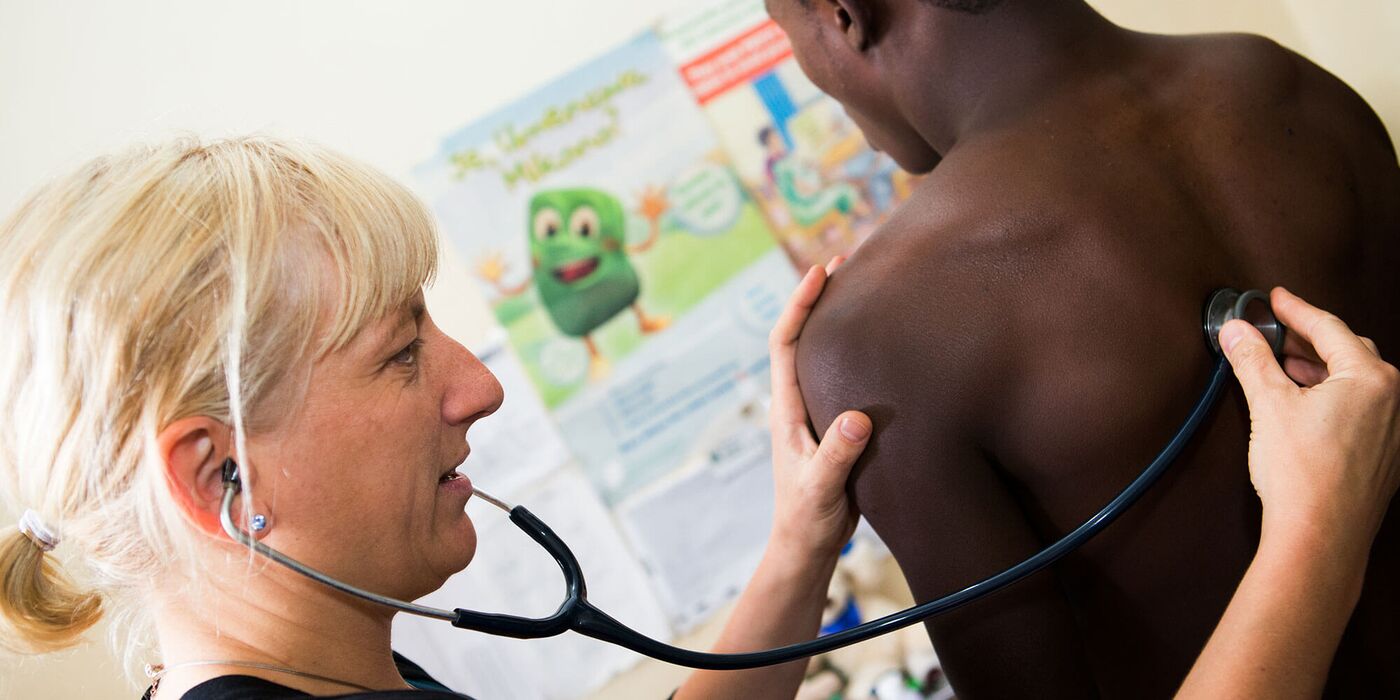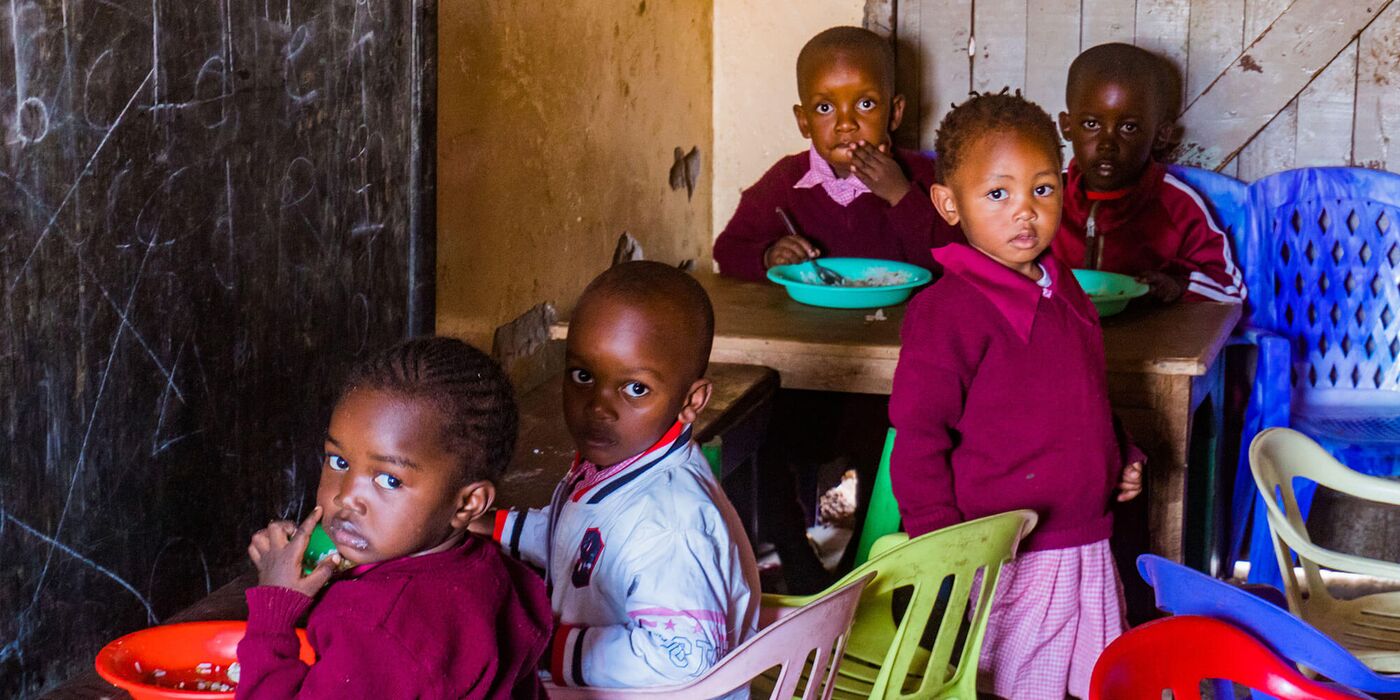Unser Nairobi-Projekt
Overview
Outpatient clinic in the slum
An estimated 500,000 people live under extreme conditions in Mathare Valley, the second-largest slum in Nairobi. These people live together under very crowded conditions in their makeshift tin huts. There are no asphalted streets, no sewage system, and only a few instable electric lines.
Many of the inhabitants suffer from gastro-intestinal diseases, HIV, and tuberculosis. Chronic conditions, like hypertension and diabetes, are constantly increasing. Many children come to our consultations in the outpatient clinic, Baraka, with broken bones, which happened while playing in the muddy unpaved streets. We founded our medical-aid project here, where help is urgently needed, over 20 years ago.






We provide medical aid and social support
What began with the first medical missions of the German Doctors in 1997 has developed into a comprehensive number of services with a competent local team. The center is the outpatient clinic in the slum, Baraka, where our mission doctors work hand in hand with the local health professionals.
Further important services provided are, among others, the nutrition program, the HIV program, and social services provided by local volunteers.
Outpatient clinic in the slum
An estimated 500,000 people live under extreme conditions in Mathare Valley, the second-largest slum in Nairobi. These people live together under very crowded conditions in their makeshift tin huts. There are no asphalted streets, no sewage system, and only a few instable electric lines.
Many of the inhabitants suffer from gastro-intestinal diseases, HIV, and tuberculosis. Chronic conditions, like hypertension and diabetes, are constantly increasing. Many children come to our consultations in the outpatient clinic, Baraka, with broken bones, which happened while playing in the muddy unpaved streets. We founded our medical-aid project here, where help is urgently needed, over 20 years ago.
We provide medical aid and social support
What began with the first medical missions of the German Doctors in 1997 has developed into a comprehensive number of services with a competent local team. The center is the outpatient clinic in the slum, Baraka, where our mission doctors work hand in hand with the local health professionals.
Further important services provided are, among others, the nutrition program, the HIV program, and social services provided by local volunteers.
Dates & Facts
Project start: 1997
Number of doctors: there are usually four or five German Doctors on site.
Missions: 995 volunteer missions have been performed since the beginning in 1997.
Patient contacts: approximately 60,000 treatments are performed in Nairobi annually.
Partner: Baraka Healthnet Limited (formerly known as ̔German Doctors Nairobi’ ) has been registered as the responsible body with its own legal entity since 2012. The HIV program works closely with the Coptic Hope Center Kenya.



Structure: The mission doctors work in a stationary outpatient clinic, the ̔Baraka Health Center’ in the Mathare Valley Slum. Aside from the outpatient clinic, we also run a nutrition center, a HIV program, and a community-based program.
Area of service provided: Mathare Valley, the second-largest slum in Nairobi with an estimated population of 500,000.
Commonest health problems: HIV/Aids and the accompanying opportunistic diseases, like tuberculosis, malaria, gastro-intestinal diseases, pneumonias, diabetes, asthma, and undernourishment.
Project start: 1997
Number of doctors: there are usually four or five German Doctors on site.
Missions: 995 volunteer missions have been performed since the beginning in 1997.
Patient contacts: approximately 60,000 treatments are performed in Nairobi annually.
Partner: Baraka Healthnet Limited (formerly known as ̔German Doctors Nairobi’ ) has been registered as the responsible body with its own legal entity since 2012. The HIV program works closely with the Coptic Hope Center Kenya.
Structure: The mission doctors work in a stationary outpatient clinic, the ̔Baraka Health Center’ in the Mathare Valley Slum. Aside from the outpatient clinic, we also run a nutrition center, a HIV program, and a community-based program.
Area of service provided: Mathare Valley, the second-largest slum in Nairobi with an estimated population of 500,000.
Commonest health problems: HIV/Aids and the accompanying opportunistic diseases, like tuberculosis, malaria, gastro-intestinal diseases, pneumonias, diabetes, asthma, and undernourishment.
Outpatient Clinic
Outpatient clinic in the middle of the slum
There is a great deal to do in our outpatient clinic, Baraka, in the middle of the slum. The waiting room is often already completely full by 8 o’clock in the morning. Social screening determines whether the patients must pay a small fee or can be treated for free.
Our goal, strengthening the local health system by training local employees, has been successful. We have hired over 80 local colleagues, all of whom work together cooperatively. Our German Doctors and the local team see 250 to 400 patients every working day.






Focus on patients with chronic diseases
Like in almost all of our projects, many people in Nairobi suffer from chronic diseases, which are often treated too late or insufficiently. As a result, these individuals can no longer work, which endangers the survival of the entire family. Our team is determined to further improve the treatment of chronically ill individuals. The professional health staff, who have been trained with the help of the German Doctors, are in charge of patients with asthma, diabetes, thyroid disorders, and hypertension.
Outpatient clinic in the middle of the slum
There is a great deal to do in our outpatient clinic, Baraka, in the middle of the slum. The waiting room is often already completely full by 8 o’clock in the morning. Social screening determines whether the patients must pay a small fee or can be treated for free.
Our goal, strengthening the local health system by training local employees, has been successful. We have hired over 80 local colleagues, all of whom work together cooperatively. Our German Doctors and the local team see 250 to 400 patients every working day.
Focus on patients with chronic diseases
Like in almost all of our projects, many people in Nairobi suffer from chronic diseases, which are often treated too late or insufficiently. As a result, these individuals can no longer work, which endangers the survival of the entire family. Our team is determined to further improve the treatment of chronically ill individuals. The professional health staff, who have been trained with the help of the German Doctors, are in charge of patients with asthma, diabetes, thyroid disorders, and hypertension.
Feeding Program
Combatting malnutrition and nutritional deficiency
Many children in Mathare Valley, the second-largest slum in Kenya, suffer from malnutrition or nutritional deficiency. Seasonal and repeated food crises and the related enormous rise in the prices for basic foodstuffs have further exacerbated the scale of malnutrition. Therefore, the German Doctors offers various feeding programs at its Feeding Centre not far from the Baraka Outpatient Clinic. Undernourished children are fed with a special formula under medical supervision and weekly monitoring. Food is also supplied to other groups, such as HIV-positive pregnant women and adults with tuberculosis.





Aside from the provision of food, family aid plays an important role. Mothers are educated in matters like breast-feeding, providing nourishing meals with inexpensive local products, and hygiene.
The German Doctors finances a daily warm meal in 2 slum schools to motivate as many children as possible to attend school.
Combatting malnutrition and nutritional deficiency
Many children in Mathare Valley, the second-largest slum in Kenya, suffer from malnutrition or nutritional deficiency. Seasonal and repeated food crises and the related enormous rise in the prices for basic foodstuffs have further exacerbated the scale of malnutrition. Therefore, the German Doctors offers various feeding programs at its Feeding Centre not far from the Baraka Outpatient Clinic. Undernourished children are fed with a special formula under medical supervision and weekly monitoring. Food is also supplied to other groups, such as HIV-positive pregnant women and adults with tuberculosis.
Aside from the provision of food, family aid plays an important role. Mothers are educated in matters like breast-feeding, providing nourishing meals with inexpensive local products, and hygiene.
The German Doctors finances a daily warm meal in 2 slum schools to motivate as many children as possible to attend school.
HIV
Medical supervision and self-help groups
As overall in Africa, HIV is one of the most urgent problems with which the German Doctors has been confronted from the very beginning. They especially offered women with AIDS self-help groups early because these women suffer immensely under the results of the disease. They are often rejected by their husbands and therefore have no social net.
In 2001 the German Doctors initiated their own HIV program, first to advise people and to inform them of their HIV status through testing. Only those who know that they are HIV+ and receive appropriate support will behave responsibly and avoid spreading the disease.



The German Doctors have had AIDS medication available since 2005, albeit initially only for a small group of patients. Support from the USA has enabled us to provide treatment for 2,400 patients in the HIV program. More than 2,000 of these people receive antiretroviral therapy (ART). This enables them to achieve a considerably longer survival time and improved quality of life. Infected mothers and fathers can, despite their severe illnesses, continue to take care of their families.
Pregnant women infected with HIV and their children are especially intensively supported and advised to prevent contagion of the babies.
Many HIV+ people still die of tuberculosis, which is easy to treat if it is diagnosed early enough. Therefore, tuberculosis diagnosis and treatment are important components of our HIV project.
Medical supervision and self-help groups
As overall in Africa, HIV is one of the most urgent problems with which the German Doctors has been confronted from the very beginning. They especially offered women with AIDS self-help groups early because these women suffer immensely under the results of the disease. They are often rejected by their husbands and therefore have no social net.
In 2001 the German Doctors initiated their own HIV program, first to advise people and to inform them of their HIV status through testing. Only those who know that they are HIV+ and receive appropriate support will behave responsibly and avoid spreading the disease.
The German Doctors have had AIDS medication available since 2005, albeit initially only for a small group of patients. Support from the USA has enabled us to provide treatment for 2,400 patients in the HIV program. More than 2,000 of these people receive antiretroviral therapy (ART). This enables them to achieve a considerably longer survival time and improved quality of life. Infected mothers and fathers can, despite their severe illnesses, continue to take care of their families.
Pregnant women infected with HIV and their children are especially intensively supported and advised to prevent contagion of the babies.
Many HIV+ people still die of tuberculosis, which is easy to treat if it is diagnosed early enough. Therefore, tuberculosis diagnosis and treatment are important components of our HIV project.
Social services
On the move in the slum
Critically ill and bedridden patients suffer the most from the realities of slum life because they cannot even get to our outpatient clinic. Three nurses and 40 volunteer Community Health Workers take care of these patients at home under the supervision of a social worker.
Besides palliative care, our team is especially careful to see that patients with HIV and tuberculosis take their medication regularly and that their family members receive counselling.




Health information and screening
We carry out screening for undernourishment among children to recognize diseases as early as possible and prevent them. We also provide education about health topics in schools and youth groups. When we notice such a condition in a child, we inform the parents about our nourishment program. Through our work in the slum and especially through our local colleagues, some of whom grew up in Mathare, we have established a good local network and are thus able to offer our help to the very poorest inhabitants.
On the move in the slum
Critically ill and bedridden patients suffer the most from the realities of slum life because they cannot even get to our outpatient clinic. Three nurses and 40 volunteer Community Health Workers take care of these patients at home under the supervision of a social worker.
Besides palliative care, our team is especially careful to see that patients with HIV and tuberculosis take their medication regularly and that their family members receive counselling.
Health information and screening
We carry out screening for undernourishment among children to recognize diseases as early as possible and prevent them. We also provide education about health topics in schools and youth groups. When we notice such a condition in a child, we inform the parents about our nourishment program. Through our work in the slum and especially through our local colleagues, some of whom grew up in Mathare, we have established a good local network and are thus able to offer our help to the very poorest inhabitants.
Living Conditions
Mathare Valley
The Mathare Valley Slum is the second-largest slum in Nairobi with an estimated population of 500,000. People living there belong to the socio-economic class with the lowest income in urban Kenia. Most of the tin huts have no water, electricity, or sewage facilities, and there is hardly any infrastructure. Some areas sink in filth and mud in the rainy season. There is also a high rate of criminality in the district.





Despite the bad living conditions, the dwellings cost no small portion of the already meager incomes, as the tin huts belong to so-called landlords who do not live in Mathare and are only interested in earning as much as possible with their huts.
The effects of the corona pandemic and the war in the Ukraine with rising food prices has further worsened the living conditions. Many families do not know how they can feed their families and hope to be admitted to our nutrition program.
Mathare Valley
The Mathare Valley Slum is the second-largest slum in Nairobi with an estimated population of 500,000. People living there belong to the socio-economic class with the lowest income in urban Kenia. Most of the tin huts have no water, electricity, or sewage facilities, and there is hardly any infrastructure. Some areas sink in filth and mud in the rainy season. There is also a high rate of criminality in the district.
Despite the bad living conditions, the dwellings cost no small portion of the already meager incomes, as the tin huts belong to so-called landlords who do not live in Mathare and are only interested in earning as much as possible with their huts.
The effects of the corona pandemic and the war in the Ukraine with rising food prices has further worsened the living conditions. Many families do not know how they can feed their families and hope to be admitted to our nutrition program.

